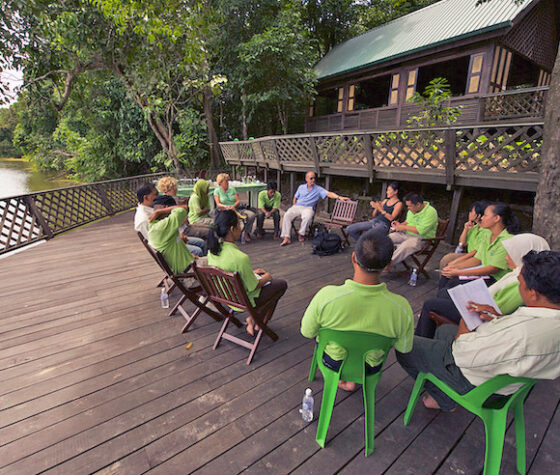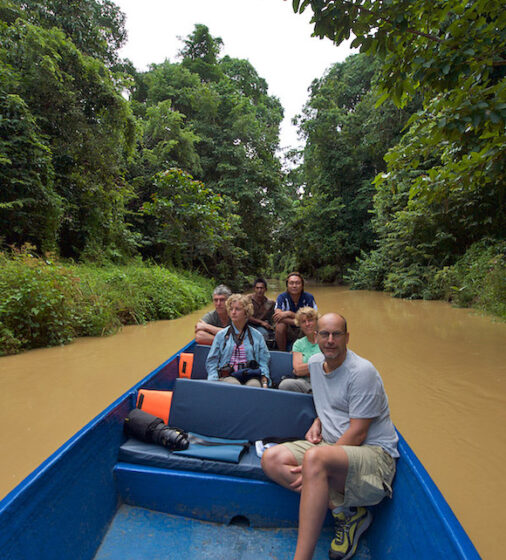Jon Stryker: Advancing inclusion, diversity, and social justice
On March 5, at a ceremony honoring distinguished alumni in the College of Environmental Design (CED) community, Dean Jennifer Wolch presented the inaugural Catherine Bauer Wurster Award for Social Practice to American architect, philanthropist, and social and environmental activist Jon Stryker (M.Arch. 1989).

Stryker is the founder and president of the Arcus Foundation a private, global grant-making organization supporting the advancement of lesbian, gay, bisexual, and transgender (LGBT) human rights, and the conservation of the world’s great apes.
In an era when diversity and social justice concerns are at the forefront of urban innovation, Jon Stryker has played an important role in ensuring that CED is set up to address these challenges. In 2000, generous funding from the Arcus Foundation established the Arcus Endowment at CED, supporting a wide range of critical activities at the intersection of LGBTQ issues in architectural and urban design and planning. Ten years later, an additional gift of $1 million, matched by the William and Flora Hewlett Foundation, created the Arcus Chair in Gender, Sexuality and the Built Environment at CED which builds upon work enabled by the Arcus Endowment.
Bestowing the award, Dean Wolch said, “Jon Stryker represents everything the award stands for — social justice, participation and inclusion, environmental conservation, affordable and humane housing, and community design.”

Stryker made numerous trips to Berkeley, listened, and had lengthy conversations with CED administration and faculty early on to help frame the Arcus Endowment at CED. Though his visionary thinking initiated the endeavor, Stryker credits Associate Professor C. Greig Crysler, who is the current Arcus Chair, with being instrumental in developing the endowment’s program.
Explaining his motivation to establish the endowment at CED, Stryker remarked, “The Arcus Foundation was established in the belief that people can live in harmony with one another and the natural world and that respect for diversity among peoples and in nature is essential to a positive future for our planet and all its inhabitants. Berkeley is a progressive and remarkable institution that embodies these values. It was a natural fit.”
The Arcus Foundation underscores the importance of diversity in its value statement, noting that “solutions need to be rooted in cultural, economic, social, and ecological realities, and different perspectives can help our work achieve greater impact.” As an architect, Stryker is keenly aware of the responsibility that urban designers have to embrace diverse viewpoints and experiences in addressing the world’s most pressing social justice issues. He underscores the epidemic of LGBT youth homelessness in America: “Without housing — particularly supportive housing — we see staggering rates of HIV, suicide, and prostitution. We can better solve societal problems like this when our profession better reflects society at large. It’s no secret that architecture and development have long been dominated by white, economically privileged men. We need more diversity across the board and I’m glad that Berkeley has long been a champion of this idea — a model for other institutions to emulate.”

Recently initiated at CED, the Catherine Bauer Wurster Award for Social Practice honors the legacy of Catherine Bauer Wurster, one of the foremost housing advocates of her generation and the main architect of the U.S. Housing Act of 1937. Along with her husband, William W. Wurster, Catherine was part of the instrumental group of Bay Area designers and planners who argued for an integrated approach to urban and regional problems. According to Dean Jennifer Wolch, “As an influential member of the Berkeley architecture faculty, Catherine was the heart and social conscience of the college in her time.”
Stryker continues to press forward to impact socially just and humane causes. Recently, Arcus launched a five-year initiative directing unprecedented grants and philanthropic resources to transgender activists and organizations to ensure that transgender people can live in a world where they are recognized, valued, and supported. The Foundation was also instrumental in a successful effort to have chimpanzees declared endangered and retired from medical research in this country.
Reflecting back on his time at Berkeley, Stryker highlighted the diverse community, which seems one of the themes that grounds his life’s work. “I loved living in the Bay Area and was so energized by the incredible students I met from all over the world. Coming from a small town in Michigan, Berkeley was an intense aesthetic and eye opening experience. More than anything, it was the people — my fellow grad students and professors — who made the experience wonderful.”